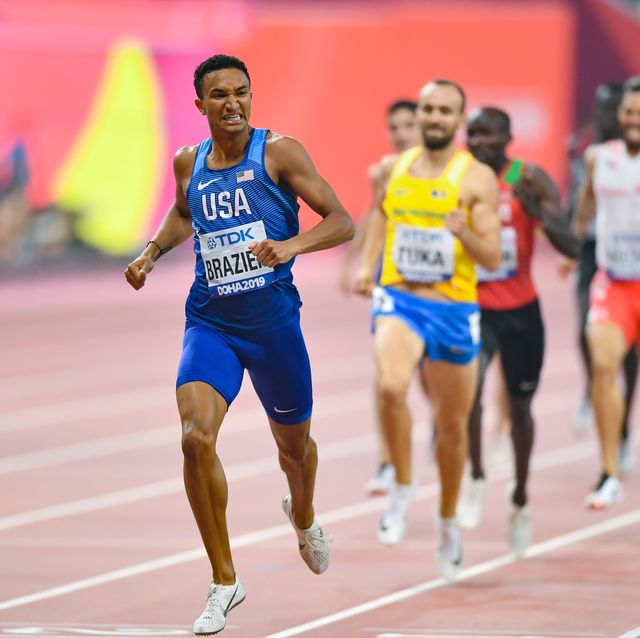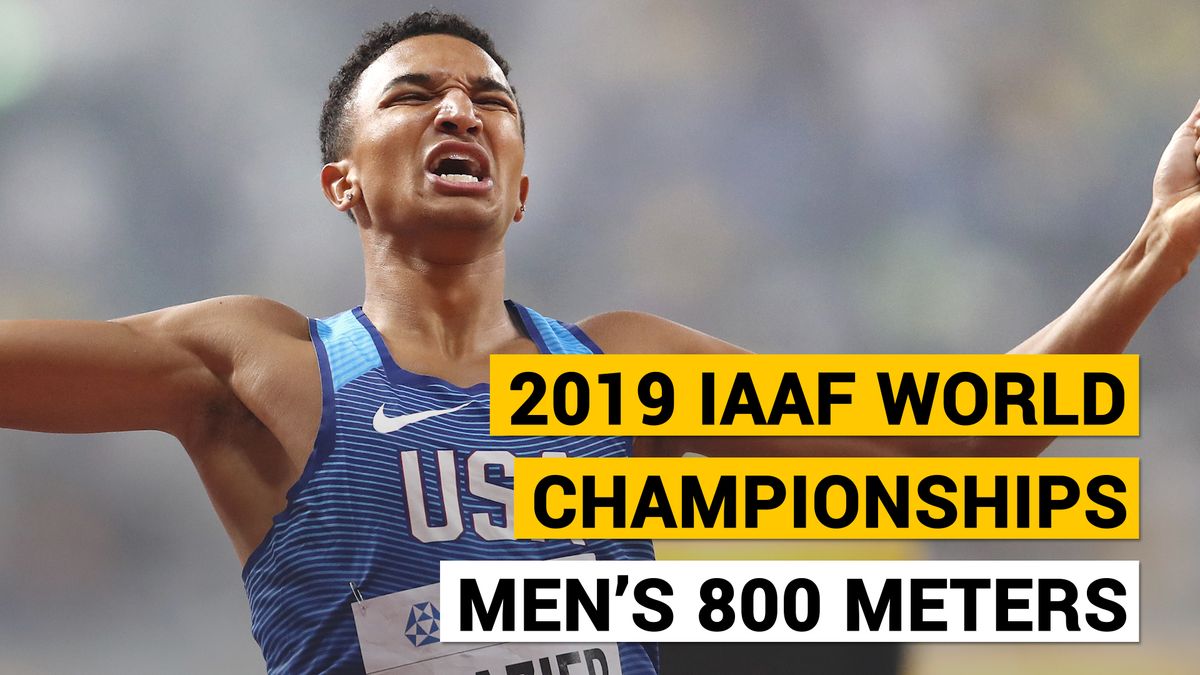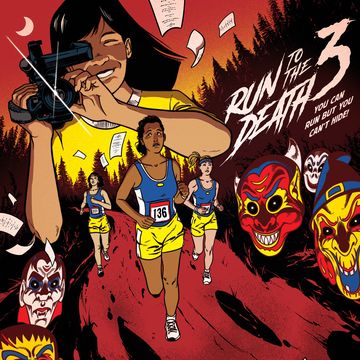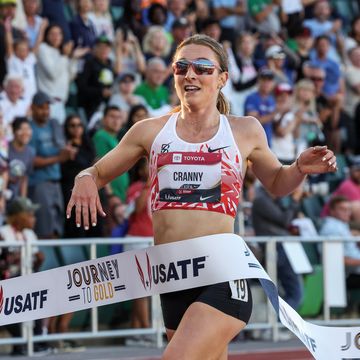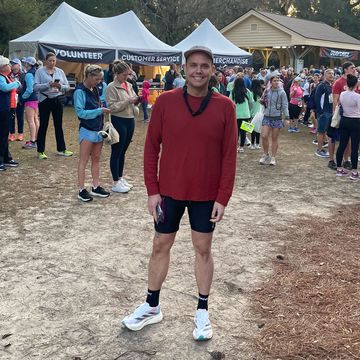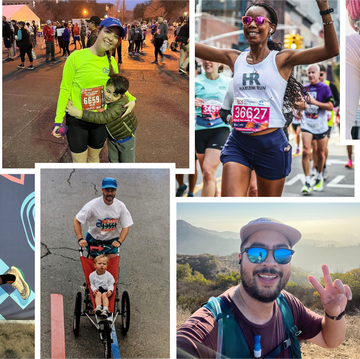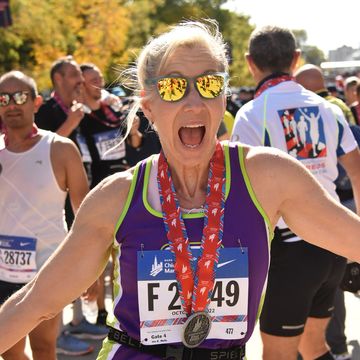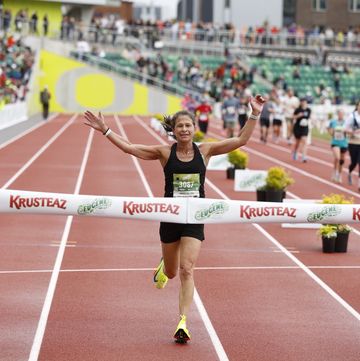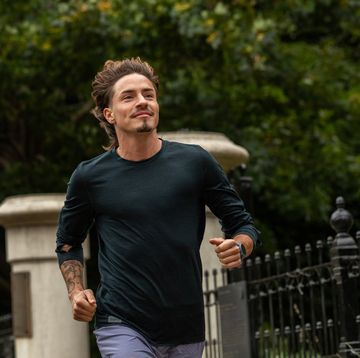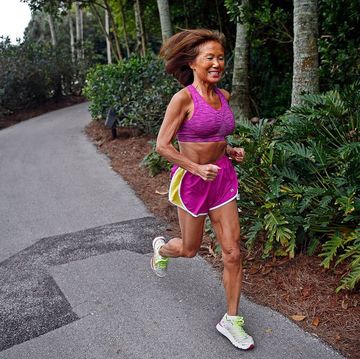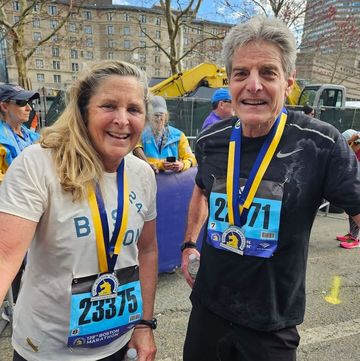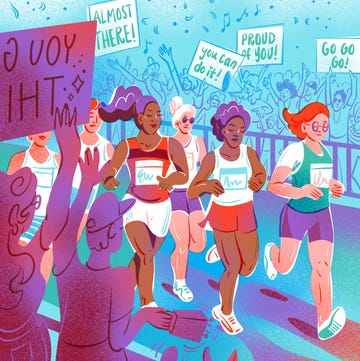In his first world championship final earlier this month, Donavan Brazier made history by winning gold in the 800 meters. In the process of becoming the world champion, the runner from Grand Rapids, Michigan, also broke a 34-year-old U.S. record in the distance.
“I just feel on top of the world,” Brazier told Runner’s World after the race on October 1 at the IAAF World Championships in Doha, Qatar.
The former Nike Oregon Project athlete dominated the race in a winning time of 1:42.34, more than a second faster than runner-up Amel Tuka of Bosnia. Now with less than a year until the 2020 Olympic Games begin in Tokyo, Brazier is looking forward to improving on his best season to date.
“I think the year I had was great, but I think I still have a lot more to give in 2020,” he said.
In an interview with Runner’s World on October 9, Brazier shared his perspective on his breakthrough 2019 season, the adversity he faced along the way as a young runner with high expectations, and the suspension of former Nike Oregon Project coach Alberto Salazar. (Brazier did not return a follow-up request for comment after Nike announced the Nike Oregon Project team will be shuttered.)
The Record Was a Surprise
When Brazier stepped on the track to run the 800-meter final in Doha, he wanted to win at all costs.
“I’ve never been so nervous in my entire life to run,” Brazier said. “I was not terrified, but it was like a mix of anxiousness and nervousness combined. I knew I was fit, I knew everyone’s fast, but it was just about doing it.”
From the gun, Wesley Vazquez of Puerto Rico assumed the lead. He took the field out in 48.99 seconds for the first 400 meters with Brazier on his heels. With 300 meters left to run, the U.S. champion accelerated past Vasquez at a speed that put about 10 meters between himself and the rest of the field. By the time he hit the homestretch, Brazier was untouchable, but he didn’t know that.
Without a jumbotron to look at from the track in Khalifa International Stadium, Brazier assumed the other runners were close, so he put his head down, drove his arms, and continued to push as fast as he could all the way through the line.
“I’m glad there wasn’t a screen on the straight,” Brazier said. “If I would’ve seen the screen, I might’ve let up a little bit and maybe missed out on the American record. So that’s probably for the best.”
The Former Record Holder Predicted It
Ever since Brazier’s freshman year of college at Texas A&M, which ended with the then 19-year-old winning the NCAA 800-meter crown and breaking the collegiate record set by Jim Ryun 50 years earlier, the expectations have been high. At the time, his 1:43.55 performance was the eighth-fastest mark ever run by an American.
Ten days after breaking the NCAA record, Brazier turned professional and competed at the 2016 U.S. Olympic Trials. But he faced disappointment in the first round of the 800 meters when he faded to fourth and didn’t qualify for the semifinal.
Brazier later moved to Florida to train with Johnny Gray—who set the American record in the 800 in 1985 with a time of 1:42.60—and 2012 Olympian Duane Solomon for a brief stint. During that time, Brazier and Gray became close, and the pair still exchange messages over Facebook every few weeks.
Brazier almost beat Gray’s mark at the Zurich Diamond League meeting in August, running 1:42.70. When the record finally fell in Doha, Gray was one of the first to congratulate Brazier. It was an “I told you so” message that Gray had been waiting to send, as Brazier recalled.
“Ever since I broke the collegiate record in 2016, Coach Gray has always kind of been a firm believer in me—me being the one to take over his American record,” Brazier said.
Trusting Strength Work and Natural Speed
When Brazier joined the Nike Oregon Project in October 2018, his coach, Pete Julian, wanted to get him stronger, trusting that his fast-twitch muscles would always be there. While higher mileage and longer, slower workout sessions are not Brazier’s favorite type of training, he learned to trust the program over time.
When he trained at Texas A&M, Brazier honed in on his speed with 25-mile weeks. Under Julian, he runs 35-mile weeks while incorporating strength workouts like fartleks. With improvements along the way—breaking the U.S. indoor 800-meter record in February and setting a 3:37 1500-meter personal best in July–Brazier learned to trust the new training.
In his last hard effort before Doha, Brazier was able to unleash his speed in a workout. The session started with one 200-meter interval in 21 seconds, followed by four minutes of recovery. After the 200 meters, he ran 2x400-meter in 50-51 seconds, followed with three minutes of recovery. The final portion of the workout was 2x100-meter sprints in 10.4-10.5 seconds. For Brazier, the workout was an encouraging reminder that his speed didn’t go anywhere.
“I knew I had the strength that I’ve been doing good workouts all year, but I think finally seeing that I didn’t lose any of that fast twitch that I developed when I was at A&M was just a big confidence booster going into the world championships,” Brazier said.
Handling the Salazar Suspension
In the fall of 2018, Brazier joined the Nike Oregon Project because he wanted to be part of the team’s initiative to win on the world’s biggest stage.
“I just knew it was the best group in the world, the best training group in the world,” Brazier said. “And their mission statement is literally to bring back world titles and Olympic medals. And what kind of athlete doesn't want to chase that?”
The morning of the 800-meter final in Doha, Brazier woke up to text messages from friends telling him the news that Salazar, the founder of the training group, was banned for four years by the United States Anti-Doping Agency. (See a full timeline of the Salazar case here.)
Brazier is not coached by Salazar, but the news came as a shock to the runner who trains in the group.
“I didn’t even know they were being investigated, and I feel like that makes me sound so stupid, but yeah I literally had no clue about this investigation that was going,” Brazier said. “To see that ban, I was really disappointed because I wish that was something that was brought up in earlier terms because if I would've known something like this would blow up and end up possibly hurting my look, maybe I would have done things differently.”
Brazier said that he didn’t worry about Salazar’s ban before his race on October 1, but he did expect questions about the group afterward.
“I kind of knew that no matter the result that Sifan [Hassan] produced or Clayton [Murphy] produced or Konstanze [Klosterhalfen] produced or I produced there was going to be questioning,” he said. “It’s because people want to make you guilty by association, so that was disappointing. But I've just always put trust in Pete [Julian] and you know, whatever happens to Pete, wherever he goes, that’s where I'm planning on going as well.”
Less than two weeks after Salazar’s ban was announced, the Nike Oregon Project was shut down. Brazier did not return a follow-up request for comment after Nike announced the team will be shuttered.
Simplifying Things
When he ran in college, Brazier said he would focus too much on trivial details when it came to training and racing. In the past year, he’s learned to simplify the process, focusing on what he can control and worrying less about achieving perfection.
“I always tried to make sure everything was perfect, but track and field is one of those sports where not everything is going to go perfect,” he said.
Instead of stressing about everyday occurrences like travel delays, hectic warmups, or finding the ideal prerace meal, Brazier tries to hone in on the things that matter most. He also tries to make time for fun activities outside of running like fishing, golf, or go-cart riding with his training partners.
“I really try not to care too much about everything and just try to simplify it as much as possible,” he said. “You know, running is a very simple sport. We like to really make it very complicated, but it's honestly such a simple, easy sport.
Taylor Dutch is a writer and editor living in Austin, Texas, and a former NCAA track athlete who specializes in fitness, wellness, and endurance sports coverage. Her work has appeared in Runner’s World, SELF, Bicycling, Outside, and Podium Runner.
